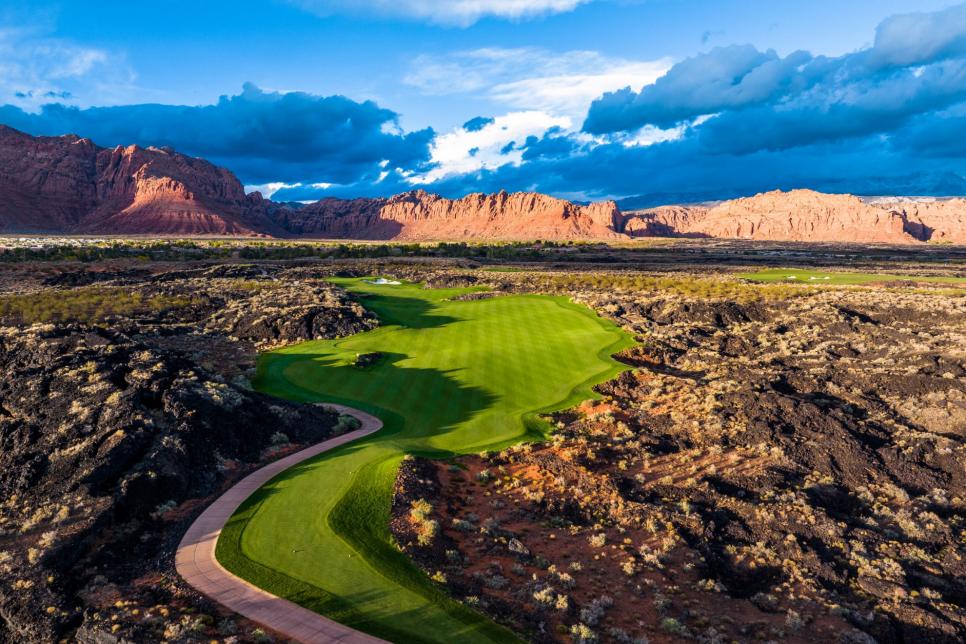The road less traveled
The improbable story of the PGA Tour and LPGA landing in the lava fields of Utah

When Mormon families were sent in the 1860s to southern Utah to establish cotton crops during the Civil War and build the town that became St. George, they faced an ominous obstacle. They and their wagons were stopped in their tracks by craggy black lava left there from the eruptions of the Santa Clara Volcano. No one knows when the last flows happened, but the pioneers soon came to know that they were better off living with this extraordinary piece of nature instead of fighting it.
That history must resonate deeply with Patrick Manning. He is the managing director of Reef Private Equity, a firm for which he leads real-estate development. Living in the Florida Keys at the time, Manning was asked in 2004 to visit a remote piece of land to assess its viability. He needed a map. He admits he had never heard of St. George, nor did he know what state it was in. More than 5 million people a year visit the Greater Zion area, but their ultimate destination is the same—the spectuclar national park that is only 30 minutes from town.
Like the Mormons 165 years earlier, Manning's first impression was one of awe—the black of the lava amid the scrubby desert, with the red hue of the mountains in the distance, and the way the light played magically off all of it. Imagine adding lush green to the palette. From that first day, he had a vision for what it could become. “I looked at my wife and she didn’t know what was going on,” Manning recalled in a recent phone interview. “I had this suffocating and overwhelming feeling that we were supposed to sell everything and move here.”
So they did, and 20 years on, Manning and his partners at Reef are about to pull off one of the most audacious accomplishments in hospitality and pro golf. “Nobody in the history of the world has done this,” Manning said of the double that will transpire this week—opening what will eventually be a $2 billion resort at the same time you host your first PGA Tour event. And not just any tournament, but the long-sought first in your state in 60 years.
“People keep using the word ‘impossible’ and asking, ‘How did you pull it off?’” Manning said. “We’ve had a ton of support.”
On Thursday, the first ball will be struck in the Black Desert Championship, the third of eight events in the PGA Tour FedEx Fall series that will determine the status of tour players who finished outside of the top 50 in the 2024 FedEx Cup. The venue is the Black Desert Resort Course, dramatized by the aforementioned lava fields, which opened to rave reviews in 2023; it was No. 2 among public courses in Golf Digest’s 2023 rankings of Best New Courses in America.
Believing he had one of the country’s most beautiful and unique facilities, Manning also was confident (naïve?) enough to think that he could simply call the leaders in pro golf and tell them they needed to hold tournaments at Black Desert. The first answers from the LPGA Tour and PGA Tour were basically: “We don’t just give people tournaments.”

Patrick Manning
Undeterred, Manning got both circuits to send reps to take a look, and as he has described numerous times about the visit by PGA Tour vice president Steve Wenzloff, they spent hours touring the 18 holes, after which Wenzloff said, “This is amazing. There’s nothing like this on tour. You’ve got it if you want it.”
“And, of course,” Manning said, “we took it.”
The four-year agreement with the PGA Tour, announced in July 2023, was not the only deal Black Desert worked out. Just over a month earlier, the resort and the LPGA came to a five-year agreement to stage a women’s tour event for the first time in the spring of 2025. The only other venue that hosts both the men and the women is the Ritz Carlton Resort’s Tiburon Golf Club in Naples, Fla., which holds the LPGA’s CME Group Tour Championship in November and PGA Tour-LPGA mixed-team Grant Thornton Invitational in December.
The layout, originally designed by Tom Weiskopf, and upon his death finished by Phil Smith, was completed months before construction was very far along on the rest of the resort. Indeed, Black Desert’s original understanding with the PGA Tour was that it would first host in 2025. But as the tour reconfigured its schedule, it pressed the developers to be ready for October 2024. “I first said, no, we can’t do that,” Manning said. “We won’t have any resort done to accommodate the players. But they kept asking.”
Manning acquiesced to the tour’s needs, moved up some of the timeline, and an army of construction workers have completed 200 of 800 planned guest rooms in the resort to house the players. Also available to them and their families will be seven restaurants, including an 11,000-square-foot sports bar. A year from now there will be a spa, waterpark and family boardwalk.

Black Desert finished No. 2 among public coursesin Golf Digest's 2023 rankings of Best New Courses in America.
“This is them manifesting things into reality,” said Marty Gorisch, the executive director of the Farmers Insurance Open at Torrey Pines who has served as a valuable consultant to the Black Desert group, which doesn’t yet have a title sponsor beyond its own company and had never staged a large-scale golf tournament before. “This resort, if you hear the history, should have never happened. They believed, and they made it happen.”
Gorsich has spent 12 years working on the Farmers Open and has encountered dozens of business leaders in the golf world. He hasn’t dealt with someone quite like Manning. “This thing would not happen without Patrick,” Gorsich said. “He saw the opportunity a long time ago, stuck with it and has been resilient.
“And he’s always humble,” Gorsich added. “He’s not walking around pounding his chest. He’s asking, ‘How can we make it better?’”
Manning contends his belief in that mantra will extend to the LPGA players come next spring, when the women’s Black Desert event will be played April 30-May 3 in the week after the first major of the year, the Chevron Championship in Houston. He said Black Desert will send eight planes to transport the players for free from Houston to St. George, and then provide complimentary accommodations at the resort site.
“We are ultra-determined to show the women the kind of love the men get and hit it out of the park,” Manning said.

First things first; there is this week’s PGA Tour event to pull off. There would seemingly be legitimate concerns about on-site attendance, considering St. George, while quickly growing, has a population of about 107,000. (The resort is officially in the town of Ivins, population 10,000.) The closest major city is Las Vegas, 120 miles away. The state’s largest metro area, Salt Lake City, is 300 miles to the north.
That would seem to put the event on something of a desert island, but Manning reported that the “vibe in Utah is off the charts,” and that corporate and ticket sales have been brisk, with the expectation of 10,000 total people on site each day. Organizers have announced that Friday and Saturday are sold out. This, for an event that doesn’t feature most of the game’s featured players.
But that appears not to matter to fans who have waited six decades for the PGA Tour to return to Utah (though they’ve hosted every iteration of the Korn Ferry Tour since 1990). The last man to win here was Tommy Jacobs, who beat Don January in the 1963 Utah Open Invitational. St. George’s more modern connection is its native son, Jay Don Blake, a one-time tour winner who is 65 and received an exemption into this week’s tournament to make his 500th tour start.
Pro golf observers can cite plenty of examples through the decades of host sites—many of them for the once-dubbed "Silly Season"—that were short-lived because they were simply looking for quick recognition and to sell rooms and real estate. Gorsich admitted that he initially had some of those thoughts about Black Desert. “But when you hear them talk about the phases of development,” he said, “it’s different. Patrick has a home here. All of the Reef partners are from Utah. This isn’t some build it and sell it off development story. They’re really intentional about how they do things.”
In Manning’s case, he arrived in the desert, saw those fields of black, and in them saw a future that few did.
“We did this for the state of Utah,” he said. “They’d been trying to get the tour here for 30 years. They just couldn’t do it. The fans wanted the PGA Tour; the state wanted the PGA Tour. We did this for them.”


